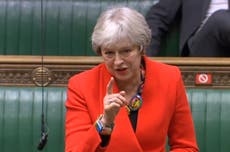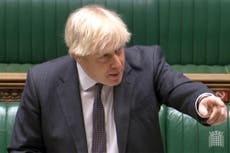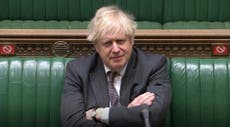Boris Johnson’s Brexit deal clears the Commons with overwhelming majority
Bill will now be sent to the House of Lords
Your support helps us to tell the story
From reproductive rights to climate change to Big Tech, The Independent is on the ground when the story is developing. Whether it's investigating the financials of Elon Musk's pro-Trump PAC or producing our latest documentary, 'The A Word', which shines a light on the American women fighting for reproductive rights, we know how important it is to parse out the facts from the messaging.
At such a critical moment in US history, we need reporters on the ground. Your donation allows us to keep sending journalists to speak to both sides of the story.
The Independent is trusted by Americans across the entire political spectrum. And unlike many other quality news outlets, we choose not to lock Americans out of our reporting and analysis with paywalls. We believe quality journalism should be available to everyone, paid for by those who can afford it.
Your support makes all the difference.Boris Johnson’s Brexit trade legislation has cleared the House of Commons with an overwhelming majority of 448 just a day before the end of the 11-month transition period.
MPs voted by 521 to 73 to pass the EU (Future Relationship) Bill, which implements the trade agreement brokered with Brussels on Christmas Eve into UK domestic law – averting a no-deal exit from the bloc.
It will now be passed to the House of Lords, where peers will also have to approve the legislation before it can receive royal assent in time for the end of the Brexit transition period at 11pm on 31 December.
Despite formally severing ties with the EU on 31 January, the UK has remained a member of the single market and has been subject to all of the bloc’s rules while Brussels and London thrashed out a trading agreement.
Ahead of the vote, Mr Johnson told MPs that the deal would bring “certainty” for businesses across the country after years of wrangling over the future relationship with the bloc.
“We are going to open a new chapter in our national story, striking free trade deals around the world and reasserting global Britain as a liberal outward-looking force for good,” the prime minister said.
But the government faced a backlash for ramming through the 85-page bill, which implements the 1,200-page trade agreement, in just a single day. Labour peer Lord Adonis described the move as a “gross abuse” of parliamentary process and claimed ministers were treating the public with “contempt”.
During the debate, Sir Keir Starmer, who ordered Labour MPs to back the deal, warning the alternative was enabling a damaging exit from the bloc without a trading agreement, also told the Commons: “Those that vote no are voting for no deal”.
“This is the nub of it: those voting no today want yes. They want others to save them from their own vote. Voting no, wanting yes, that’s the truth of the situation and that’s why my party has taken a different path.”
The Labour leader also attacked Mr Johnson for failing to be “straight” with the British public over his incorrect claim last week that there would be “no non-tariff barriers” to trade under the UK-EU agreement, despite the government already admitting businesses will face additional red tape.
Theresa May, the former prime minister who suffered a series of damaging defeats on her government’s Brexit legislation, voted for the agreement but earlier told MPs that she had offered them a “better deal” in 2019.
In a swipe at hardline Brexiteers in her own party who judged the success of the deal by the extent to which it frees the UK from entanglement in multilateral organisations like the EU, she declared: “Sovereignty does not mean isolationism”.
However, the SNP’s Westminster leader, Ian Blackford, condemned the deal as “an act of economic vandalism” and attacked Labour for failing to oppose it.
“I am sad to say that the official opposition has been missing in action. I can understand that this might be politically pragmatic for Labour but it definitely isn’t politically principled,” he said.
Earlier on Wednesday, the European Commission president, Ursula von der Leyen, and the European Council president, Charles Michel, formally signed the UK-EU agreement, before it was flown to London on a RAF plane for the prime minister to sign.





Join our commenting forum
Join thought-provoking conversations, follow other Independent readers and see their replies
Comments